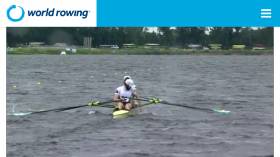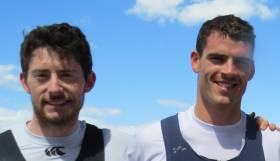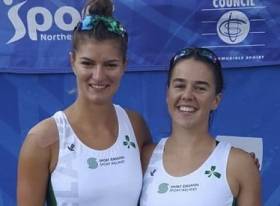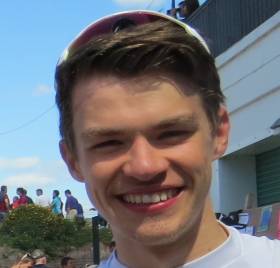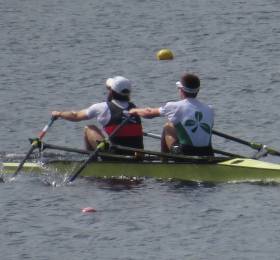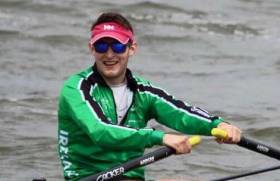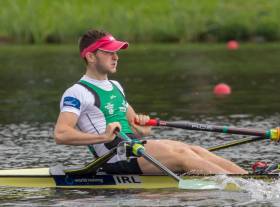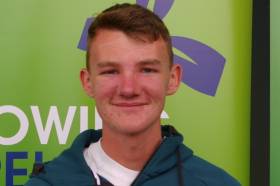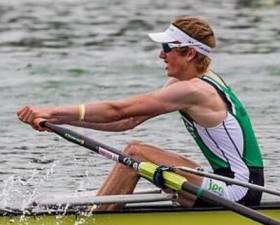Displaying items by tag: Rotterdam
#Rowing: Paul O'Donovan and Fintan McCarthy took a second silver medal for Ireland after an extraordinary final of the lightweight double sculls at the World Cup in Rotterdam today.
Ireland took over the lead early and led all the way until they were caught right on the line by Germany - the photo finish showed just .03 of a second between the crews.
The race had a memorable moment in the second quarter. Paul O'Donovan showed great calmness to reach down and grab what looked like the stroke coach of the bowman which had gone over the side to shuck it back in the boat. The incident may have cost the crew time, but they retained their lead from there to the line.
Ronan Byrne and Philip Doyle had earlier sculled really well to take silver in the men's openweight double sculls.
World Cup Regatta, Rotterdam, Day Three (Irish interest)
Men
Double Sculls - A Final: 1 Switzerland 6:41.04, 2 Ireland (P Doyle, R Byrne) 6:41.74, 3 Britain 6:44.95.
Lightweight Double Sculls - A Final: 1 Germany 7:01.59, 2 Ireland (F McCarthy, P O'Donovan) 7:01.62, 3 Norway 7:02.26.
Women
Pair - A Final: 1 Australia 7:26.15, 2 New Zealand 7:27.57, 3 Britain 7:40.51; Ireland (A Crowley, M Dukarska) 7:50.08.
Lightweight Double Sculls - B Final (places 7 to 12): 6 Ireland (L Heaphy, D Walsh) 7:45.98.
Brilliant Silver for Ireland's Doyle and Bryne at World Cup
#Rowing: Ireland took a silver medal at the World Cup Regatta in Rotterdam. The double of Ronan Byrne and Philip Doyle mastered tough conditions well. They moved steadily up on early leaders Switzerland and Germany, and passed the Germans. They then pushed right up on Switzerland and, with a tremendous finish, closed to under a length off them - .7 of a second - as the crews crossed the line.
World Cup Regatta, Rotterdam, Day Three (Irish interest)
Men
Double Sculls - A Final: 1 Switzerland 6:41.04, 2 Ireland (P Doyle, R Byrne) 6:41.74, 3 Britain 6:44.95.
Women
Pair - A Final: 1 Australia 7:26.15, 2 New Zealand 7:27.57, 3 Britain 7:40.51; Ireland (A Crowley, M Dukarska) 7:50.08.
Lightweight Double Sculls - B Final (places 7 to 12): 6 Ireland (L Heaphy, D Walsh) 7:45.98.
Ireland's Dukarska and Crowley Sixth at Rotterdam World Cup
#Rowing: Ireland's Aileen Crowley and Monika Dukarska took sixth in the A Final of the women's pairs at the World Cup Regatta in Rotterdam. Ireland featured well in the early stages, but Australia and New Zealand moved away. They would finish in that order after a good battle. Britain took the bronze. Ireland and Spain battled for fifth, with Spain taking it by 1.63 seconds.
Lydia Heaphy and Denise Walsh finished sixth in their B Final of the lightweight double sculls, to take 12th overall.
World Cup Regatta, Rotterdam, Day Three (Irish interest)
Women
Pair - A Final: 1 Australia 7:26.15, 2 New Zealand 7:27.57, 3 Britain 7:40.51; Ireland (A Crowley, M Dukarska) 7:50.08.
Lightweight Double Sculls - B Final (places 7 to 12): 6 Ireland (L Heaphy, D Walsh) 7:45.98.
#Rowing: Paul O'Donovan and Fintan McCarthy brought the tally of Ireland A Finalists at the World Cup Regatta in Rotterdam to four with a second-placed finish in their semi-final. Germany's Jason Osborne and Jonathan Rommelmann, racing in the favoured lane one were the dominant crew, but the new Ireland lightweight double finished fast, coming to just about a length on the line.
The Ireland women's lightweight double were out in lane six in the revised lane draw in their semi and finished sixth. Lydia Heaphy and Denise Walsh are set for a B Final.
World Cup Regatta, Rotterdam, Day Two (Irish interest; morning session)
Men
Double Sculls - Semi-Final Two (First Three to A Final; rest to B Final): 1 Ireland (P Doyle, R Byrne) 6:33.47, 2 Germany 6:36.17, 3 Australia One 6:38.62
Lightweight Double Sculls - Semi-Final Two (First Three to A Final; rest to B Final): 1 Germany One 6:42.04, 2 Ireland (F McCarthy, P O'Donovan) 6:43.70, 3 Australia 6:50.80.
Lightweight Single Sculls - Semi-Final Two (First Three to A Final; rest to B Final): 1 Slovenia 7:22.30, 2 3 Ireland One (G O'Donovan) 7:25.89, 3 Switzerland 7:27.70; 4 Ireland Two (J McCarthy) 7:34.79.
Women
Pair - Semi-Final One (First Three to A Final; rest to B Final): 1 Romania One 7:34.61, 2 Ireland (A Crowley, M Dukarska) 7:37.87, 3 Spain 7:39.49.
Lightweight Double Sculls - Semi-Final Two (First Three to A Final; rest to B Final): 6 Ireland (L Heaphy, D Walsh) 7:49.87.
Ireland Crews Weather Storm and Stay on Course
#Rowing: Paul O'Donovan and Fintan McCarthy hit the right mark in their first competitive race as the new Ireland lightweight double. At the World Cup Regatta in Rotterdam, they finished .39 seconds ahead of Australia in their time trial and qualified directly for the semi-finals.
The heats were run on a time trial basis as the regatta was buffeted by a storm and racing had to be delayed and the programme altered.
All six Ireland crews made it straight through in the changed system. The Ireland men's double of Philip Doyle and Ronan Byrne posted the best time in their heat, just ahead of Switzerland, who also qualified.
Aileen Crowley and Monika Dukarska also made it straight through. The Ireland pair finished second in their time trial to the outstanding New Zealand crew of Kerri Gowler and Grace Prendergast.
Jake McCarthy and Gary O'Donovan both qualified from their heats of the lightweight single sculls. McCarthy took second and O'Donovan third.
The one Irish crew which fell outside automatic qualification was the lightweight women's double of Lydia Heaphy and Denise Walsh. They finished fourth, but made it through as one of the fastest losers.
O'Donovan and Lightweight Pair Race Into World Rowing Finals
#Rowing: Paul O'Donovan won his semi-final after another exciting tussle and the Ireland lightweight pair also qualified for their A Final at the World Rowing Championships in Rotterdam today.
Lightweight sculler O'Donovan put in a remarkable middle third of the race to move from sixth to second in very hot conditions . He then pushed for the lead, but Rajko Hrvat of Slovenia was a dogged opponent. The two raced to the line - O'Donovan won by just over half a second.
Mark O'Donovan and Shane O'Driscoll reached their A Final by taking second. They raced France for most of the 2,000 metres and were still in touch at the end.
World Rowing Championships, Rotterdam (Irish interest; selected results)
Men
Lightweight Pair A/B Semi-Final Two (Three to A Final; rest to B Final): 1 France 6:30.56, 2 Ireland (M O'Donovan, S O'Driscoll) 6:32.18, 3 United States 6:33.19; 4 Brazil 6:35.07, 5 Italy 6:37.34, 6 Spain 6:40.82.
Lightweight Single Sculls - A/B Semi-Final One (Three to A Final; rest to B Final): 1 Ireland (P O'Donovan) 6:51.71, 2 Slovenia 6:52.31, 3 Germany 6:52.32; 4 Spain 6:53.21, 6 Italy 7:17.33.
Under-23 Quadruple Sculls - B Final (Places 7 to 12): 1 Russia 5:54.0; 6 Ireland (D Buckley, J Casey, P Boomer, S McKeown) 6:01.78.
O'Donovan Dominant in Heat at World Rowing Championships
#Rowing: Paul O’Donovan won his heat with a dominant performance at the World Rowing Championships in Rotterdam today. The Ireland lightweight single sculler made light of the difficult condtions and left the rest of the field behind - Japan’s Yuki Ikeda, in second, was over five seconds behind the UCD clubman. O’Donovan will now have a good lane draw in the quarter-final.
World Rowing Championships, Rotterdam (Selected Results; Irish interest)
Men
Lightweight Single Sculls - Heat Three (Four to Quarter-Finals; rest to Repechages): 1 Ireland (P O’Donovan) 7:11.73, 2 Japan 7:16.87
3 Serbia 7:19.70, 4 China 7:23.04.
Under-23 Quadruple - Repechage One (Three to A/B Semi-Finals; rest to C Final): 1 Britain 5:54.05, 2 Russia 5:56.18, 3 Ireland (D Buckley, J Casey, P Boomer, S McKeown) 5:57.67.
Great Finish By Young Ireland Rowing Crew at World Championships
#Rowing: A stirring finish saw the Ireland lightweight quadruple elbow their way into the semi-final of the World Under-23 Championships in Rotterdam today. The young crew of Fintan McCarthy, Shane O'Connell, Stephen O'Connor and Colm Hennessy clung on to third behind impressive Germany and Sweden despite a big challenge by Canada.
World Rowing Championships, Rotterdam (Selected Results; Irish interest)
Men
Under-23 Lightweight Pair - Heat Two (First Three to A/B Semi-Final; rest to Repechages): 1 Turkey 6:39.80, 2 Greece 6:40.70, 3 Ireland (S Mulvaney, D O’Malley) 6:45.09.
Under-23 Quadruple - Heat Three (First two A/B Semi-Final; rest to Repechages) 1 Australia 5:52.01, 2 Italy 5:53.31; 5 Ireland (D Buckley, J Casey, P Boomer, S McKeown) 6:15.47.
Under-23 Lightweight Quadruple - Heat One (First Three to A/B Semi-Finals; rest to Repechages): 1 Germany 6:10.05, 2 Sweden 6:11.08, 3 Ireland (F McCarthy, S O'Connell, S O'Connor, C Hennessy) 6:12.63.
O'Malley and Mulvaney Hit the Mark at World Rowing Championships
# Rowing: Ireland’s campaign at the World Championships in Rotterdam, which feature senior, under-23 and junior events, started well this morning. The Ireland Under-23 lightweight pair of David O’Malley and Shane Mulvaney secured a semi-final place. Greece and Turkey swapped places ahead of them, but the Ireland crew nailed down third and direct qualification. Germany struggled and could only take fourth and a repechage place. Turkey passed Greece before the line.
World Rowing Championships, Rotterdam (Selected Results; Irish interest)
Men
Under-23 Lightweight Pair - Heat Two (First Three to A/B Semi-Final; rest to Repechages): 1 Turkey 6:39.80, 2 Greece 6:40.70, 3 Ireland (S Mulvaney, D O’Malley) 6:45.09.
Dutch Set To Make Urban Surfing All The Rage
#Surfing - Surfing on the canals of the Netherlands? It could be a reality if Rotterdam's plans come to fruition, as Mail Online reports.
The Dutch port city's Steigersgracht Canal is the location for RiF010, a water-purification scheme that will create a five-foot wave in the waterway that might well be perfect for 'hanging ten' in the heart of the retail district.
And not only will the wave pool be an attraction for watersport enthusiasts, it's also expected to generate electricity for the locality, making it a proper green energy scheme too.
Mail Online has more on the story HERE.


























